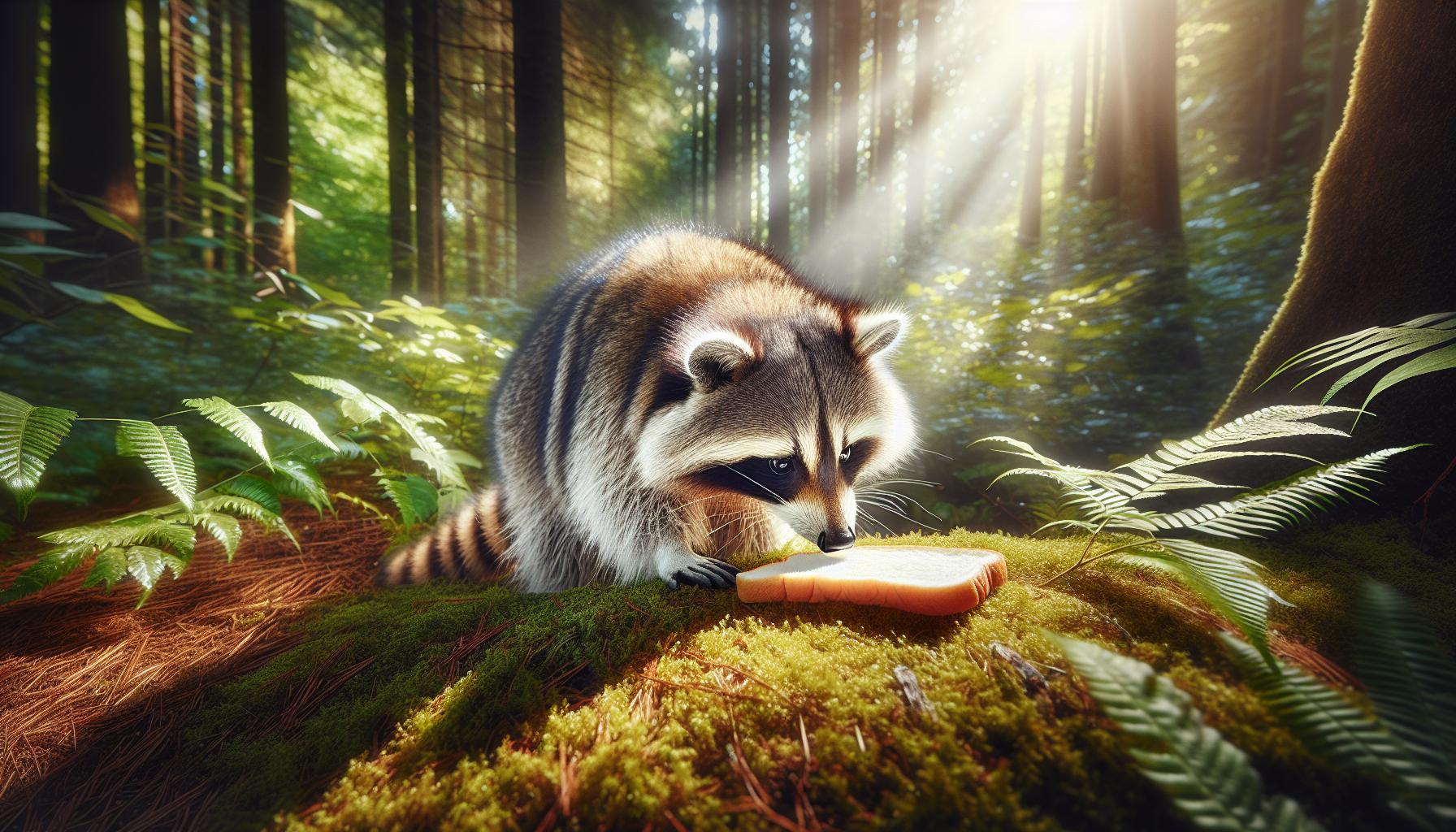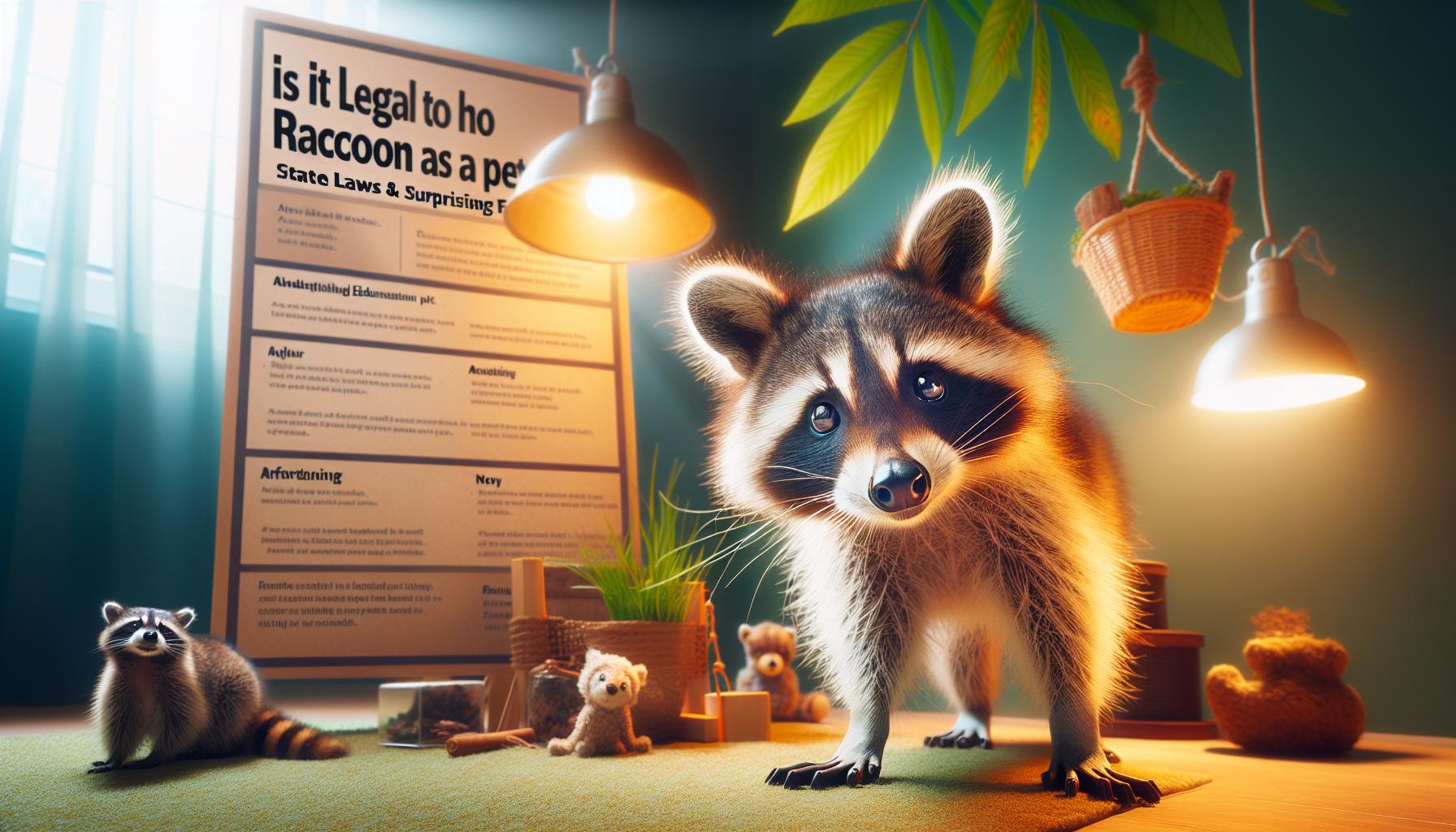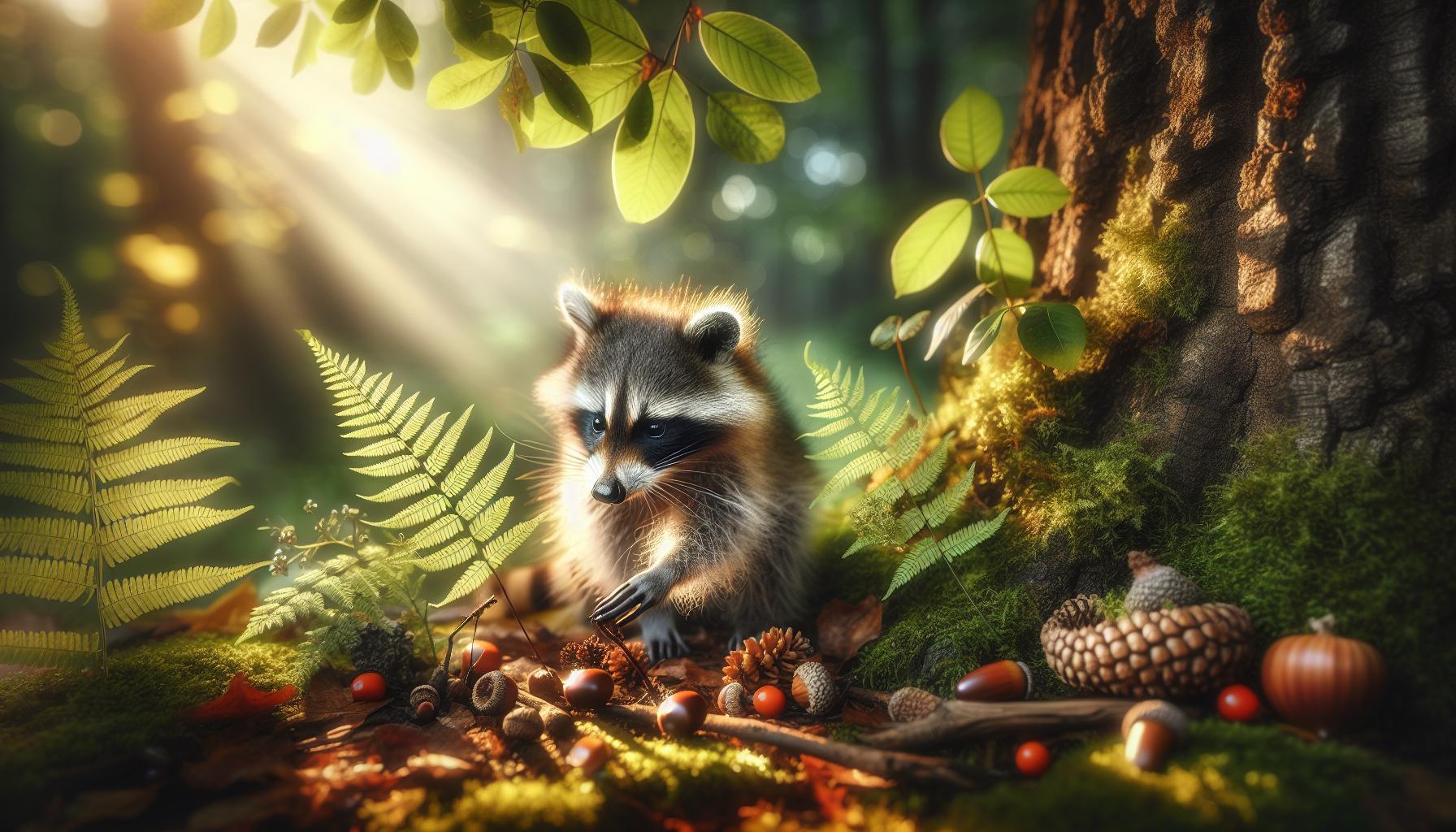Raccoons are often seen as cute and clever creatures, but feeding them can lead to unexpected challenges. Many backyard enthusiasts wonder if bread is a suitable snack for these animals. While it may seem harmless, understanding what raccoons can and cannot eat is crucial for their health and your peace of mind.
In recent stories, like that of a woman in Kitsap County who fed raccoons for decades, it’s become clear that well-meaning actions can spiral into significant wildlife management issues. As you contemplate whether to share your leftovers, consider the nutritional needs of raccoons and the potential consequences of improper feeding.
Delve into the truth about raccoons and their diet, including the role bread plays, to make informed decisions that benefit both you and these fascinating animals. Your choices can help maintain healthy wildlife populations while fostering a safer environment for your community.
Contents
- 1 Can Raccoons Safely Eat Bread?
- 2 Understanding Raccoon Diets and Nutrition
- 3 The Risks of Feeding Raccoons Human Food
- 4 What Foods Are Best for Raccoons?
- 5 Signs of a Healthy Raccoon Diet
- 6 How Bread Affects Raccoon Digestive Health
- 7 Alternatives to Bread for Raccoon Feeding
- 8 Common Misconceptions About Raccoon Diets
- 9 When to Seek Help for Raccoon Health Issues
- 10 The Impact of Human Food on Wildlife
- 11 Tips for Responsible Raccoon Feeding Practices
- 12 Q&A
- 13 Insights and Conclusions
Can Raccoons Safely Eat Bread?
Raccoons are highly adaptable creatures, known for their dexterous paws and inquisitive nature. However, when it comes to their dietary needs, bread is not an ideal choice. Although raccoons might nibble on bread if offered, it lacks the essential nutrients these animals require for healthy growth and development. Bread, primarily composed of carbohydrates, can fill them up but offers little in the way of vitamins, minerals, and proteins that form the cornerstone of a balanced diet.
Feeding bread to raccoons can lead to significant health problems, primarily due to its high carbohydrate content and low nutritional value. These animals thrive on a varied diet that includes fruits, nuts, insects, eggs, and small animals. Bread, especially when stale, can also pose a choking hazard or contribute to digestive issues. Raccoons possess a unique digestive system designed to process diverse food sources; a diet heavy in low-nutritional foods like bread can disrupt their natural gut flora and lead to complications.
To ensure raccoons receive the nutrients they need, it’s best to focus on healthier alternatives. Fruits such as apples and berries, along with lean proteins like eggs or cooked chicken, provide better nourishment. If you live in an area where raccoons are common, offering these kinds of foods can attract them in a more beneficial way, promoting their health without compromising their dietary integrity. While the sight of a raccoon happily munching on a piece of bread might be tempting, the truth is that this food doesn’t support their well-being.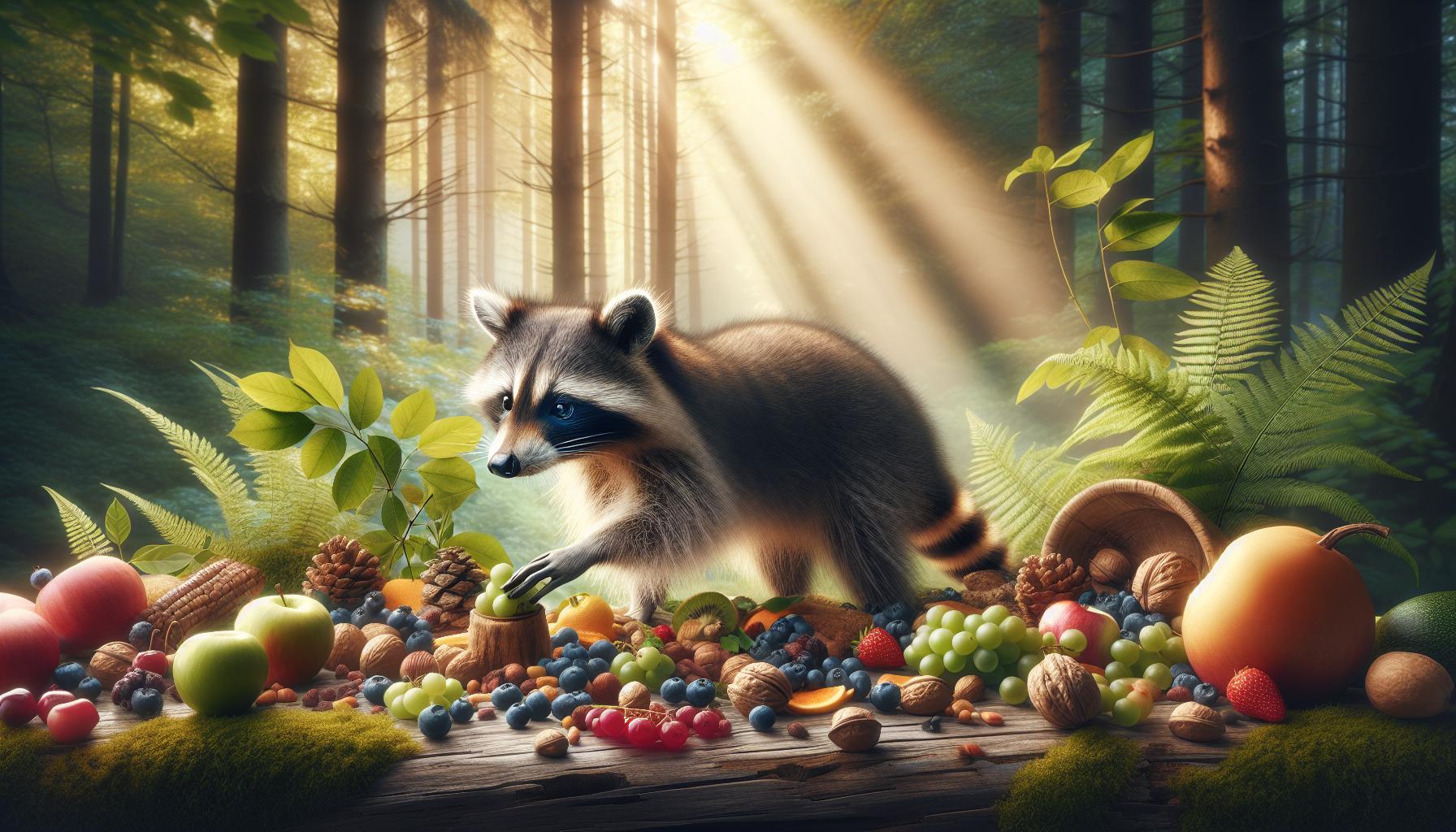
Understanding Raccoon Diets and Nutrition
Raccoons are fascinating omnivores, renowned for their adaptability and cleverness. Found in urban areas and forests alike, their diets are as diverse as their habitats. Unlike many animals that adhere to a strict eating routine, raccoons forgo conventional boundaries by feasting on a mixture of plant materials and animal proteins. This adaptability makes them successful in varied environments, but it also raises questions about what specific foods are most beneficial to their health.
Understanding the nutritional needs of raccoons requires acknowledging the role of variety in their diets. In their natural habitat, raccoons consume fruits, nuts, seeds, insects, and small animals, providing them with a broad spectrum of nutrients. To mimic this natural balance, wild and domesticated raccoons require access to foods rich in vitamins, minerals, and proteins. Offering a mix of fresh fruits-such as apples, berries, and melons-along with sources of protein like eggs, lean meats, and even some leafy greens ensures that their dietary needs are met efficiently.
Moreover, the impact of excess carbohydrates, typically found in human foods, including bread, can be detrimental. When raccoons eat foods that are low in nutrients, they risk nutritional deficiencies that can affect their health and behavior. While raccoons might enjoy a taste of bread due to its carbohydrate content, such treats lack vital elements necessary for their well-being. A steady diet of carby foods can lead to obesity and other health issues. For a balanced intake, it’s crucial to concentrate on foods that replicate their natural dietary patterns to support their overall health and longevity.
In conclusion, recognizing that raccoons are more than just scavengers encourages a deeper appreciation for their dietary complexity. Instead of feeding them bread or other processed human foods, offering an array of natural alternatives fosters a healthier lifestyle for these inventive creatures. By understanding their nutritional requirements and providing appropriate foods, we can help ensure that raccoons thrive in both wild and managed settings.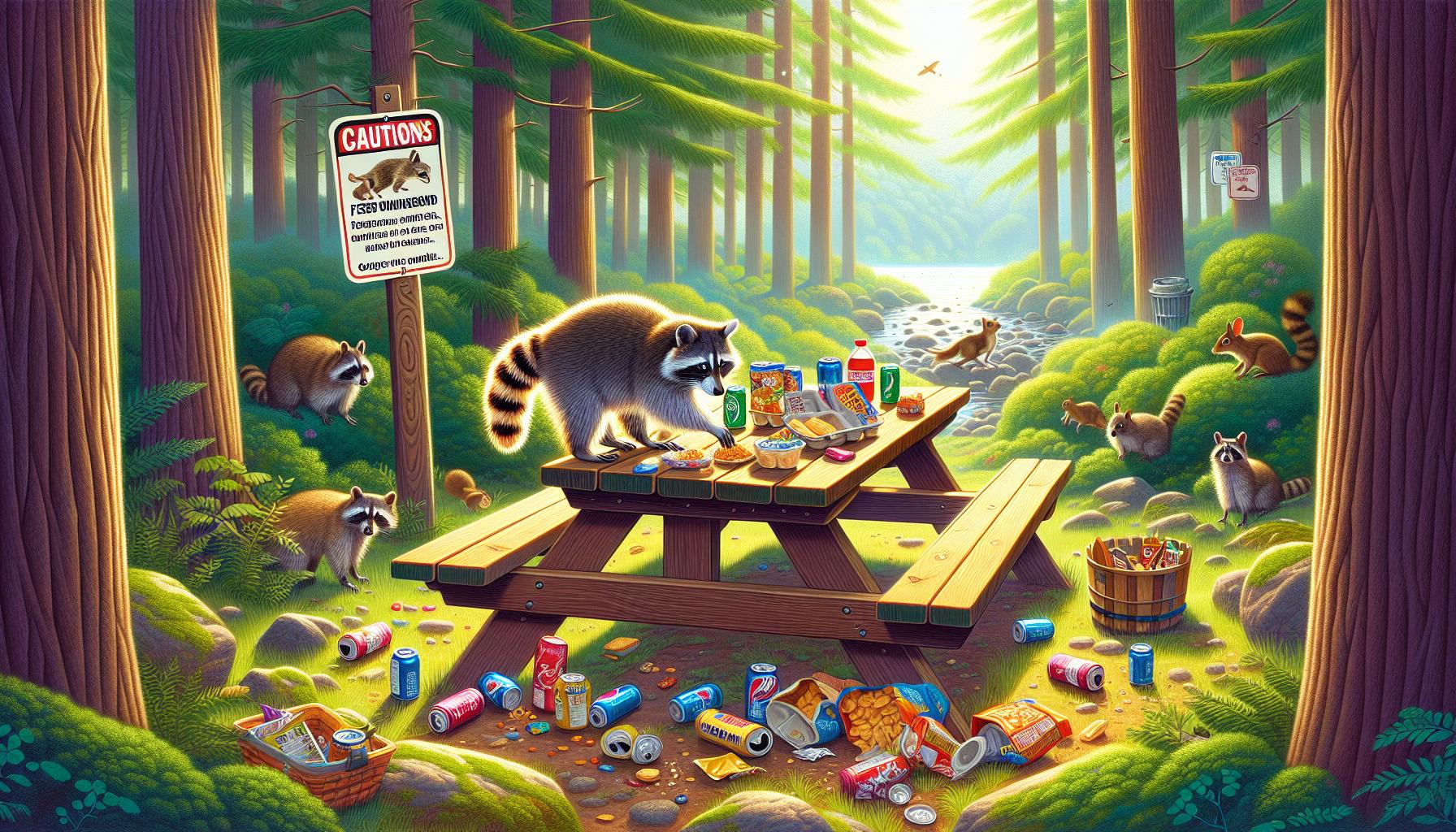
The Risks of Feeding Raccoons Human Food
Feeding raccoons human food may seem like a harmless act, given their natural curiosity and adaptability, but it poses significant risks to their health and behavior. These intelligent creatures are opportunistic omnivores, which means they can thrive on a diverse diet in the wild, typically consisting of fruits, nuts, insects, and small animals. However, when humans introduce processed foods into their diet, particularly those high in carbohydrates like bread, it can lead to detrimental effects on their well-being.
One major concern with feeding raccoons bread or other human food is the imbalance it creates in their nutritional intake. Raccoons require a diet rich in vitamins and minerals that are often absent in processed foods. When they opt for high-carb options, they risk nutritional deficiencies, leading to health issues such as obesity, diabetes, and other metabolic disorders. Just like humans, when raccoons consume excessive amounts of non-nutritive food, it can lead to long-term health consequences that may shorten their lifespan.
Moreover, relying on human food can alter raccoons’ natural foraging behavior. When they are repeatedly fed bread or similar foods, they become conditioned to seek out and depend on these easily accessible sources rather than engaging in their instinctual behaviors of foraging for diverse, natural foods. This behavioral shift not only hampers their survival skills but also increases the likelihood of human-wildlife conflicts, as they may become more comfortable raiding garbage cans, intruding on homes, or approaching humans for food.
Additionally, human food can expose raccoons to harmful substances that may be present in prepared foods, such as sugars, preservatives, and unhealthy fats. These ingredients can lead to gastrointestinal upset and longer-term health problems. Instead of offering bread, it’s essential to provide a balanced diet that mirrors what they would consume in the wild. This may involve offering fruits, vegetables, and protein sources, ensuring that raccoons can thrive while maintaining their natural instincts. By understanding the risks and responsibilities involved in feeding these remarkable animals, we can contribute to their health and sustainability in the wild.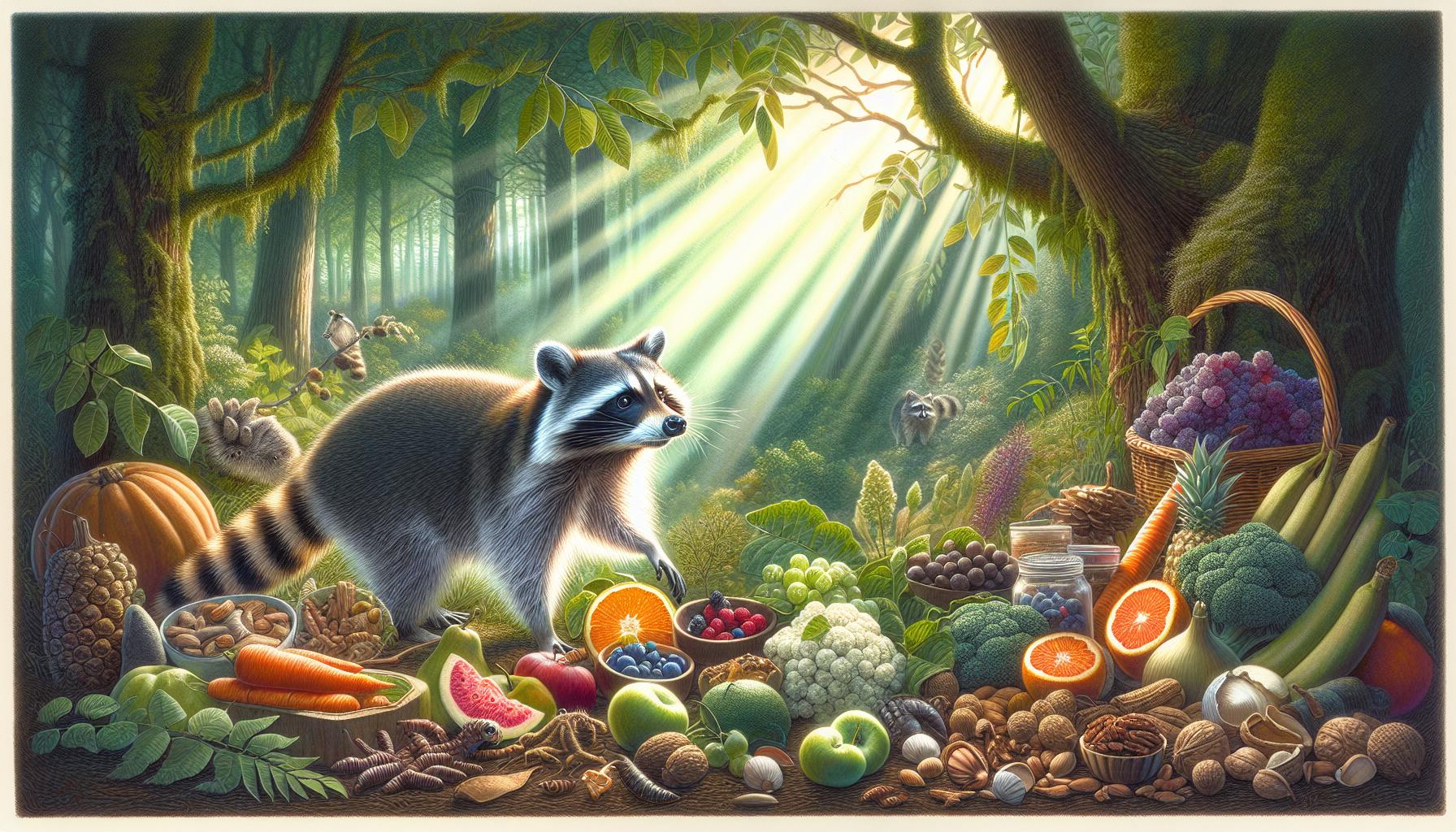
What Foods Are Best for Raccoons?
Raccoons are often viewed as resourceful foragers, capable of thriving on a diet that reflects their opportunistic omnivore nature. Understanding what foods are best suited for these clever creatures not only helps maintain their health but also fosters their natural instincts. Ideally, a raccoon’s diet should mimic what they would naturally consume in the wild. This includes a rich variety of nutrients found in fruits, vegetables, and protein sources, ensuring they receive the necessary vitamins and minerals for robust health.
- Fruits: Raccoons enjoy a range of fruits such as apples, berries, and grapes. These provide essential vitamins and hydration, making them a delicious and healthy choice.
- Vegetables: Leafy greens like spinach and kale, as well as root vegetables such as carrots, can offer dietary fiber and additional nutrients.
- Proteins: Aiding a raccoon’s muscles and overall health, sources of protein can include cooked eggs, fish, and small amounts of lean meat. Additionally, insects and even some commercial high-quality pet foods can meet their protein needs.
- Nuts and Seeds: Natural snacks like walnuts or sunflower seeds can provide healthy fats, though these should be given in moderation to avoid excessive caloric intake.
Not only is it pivotal to focus on these wholesome options, but the manner in which raccoons acquire their food is equally significant. Encouraging them to forage naturally rather than associate humans with easy meals is crucial. This not only preserves their instinctual behavior but also minimizes the risk of developing dependency on human food sources.
Ultimately, the healthiest approach involves providing raccoons with a diverse, well-rounded diet that mirrors their natural eating habits. This strategy not only supports their well-being but also respects the delicate balance required for wildlife coexistence. By empowering raccoons to thrive on a natural diet, we can contribute to their health while preserving the spirited charm that makes them a beloved part of our shared ecosystem.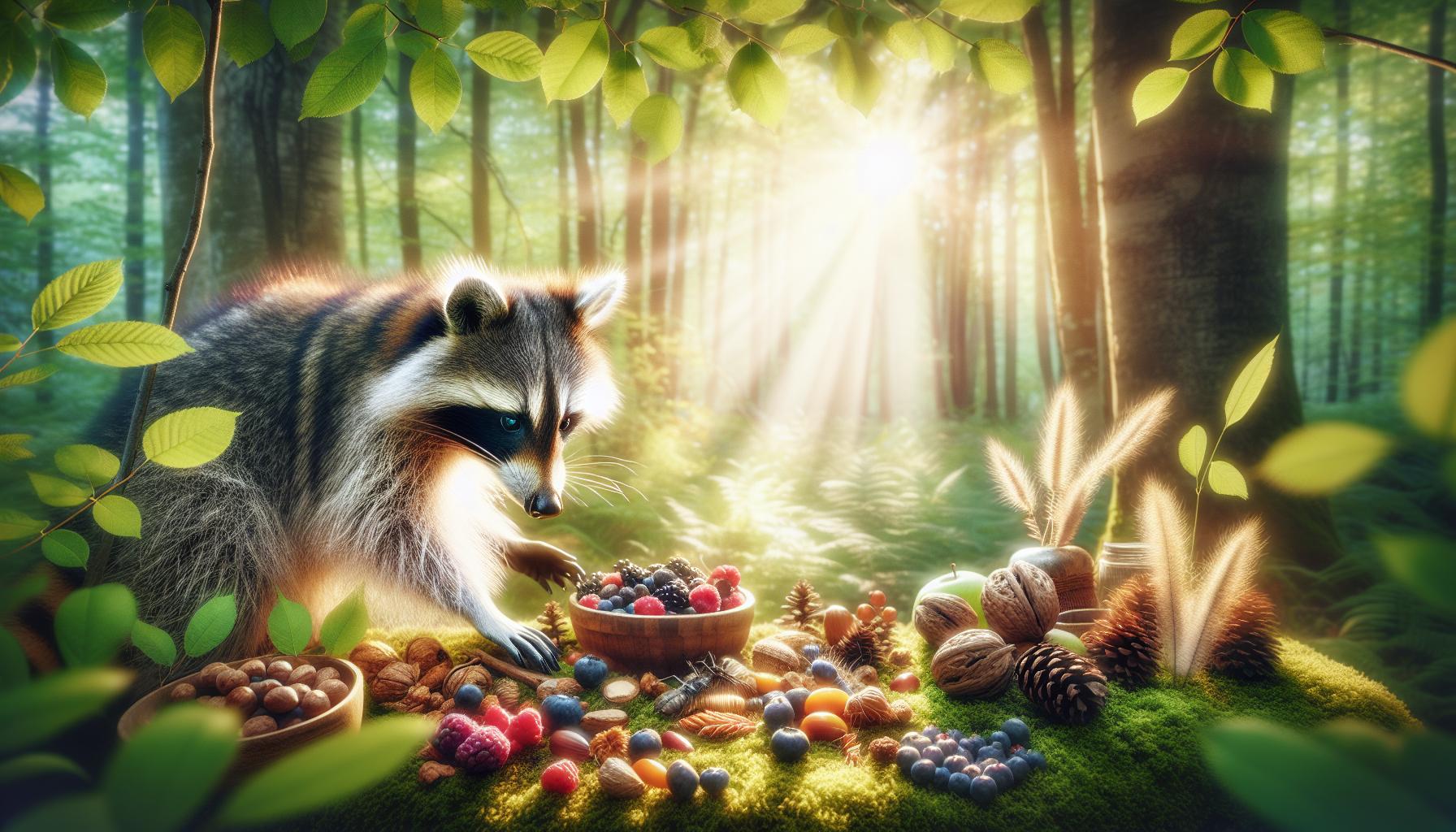
Signs of a Healthy Raccoon Diet
Raccoons exhibit fascinating behaviors that reflect their adaptability and foraging skills. One of the most straightforward indicators of a healthy raccoon diet is the overall vitality and weight of the animal. Healthy raccoons typically display a robust and muscular body condition, without signs of excessive thinness or obesity. Their fur should be thick and glossy, indicating proper nutrition. Pay close attention to their activity levels as well; a well-nourished raccoon will be more energetic, actively exploring their environment and engaging in natural behaviors.
Another vital sign of a balanced diet can be observed in the raccoon’s waste. Healthy feces should be firm and well-formed, reflecting proper digestion of a suitable variety of foods. If raccoon droppings are excessively loose or watery, it could indicate dietary issues or health problems that should be addressed. In contrast, a diet rich in fiber from fruits and vegetables will promote regular, healthy bowel movements.
Raccoons are known as opportunistic omnivores, and therefore their diet should consist of a wide array of food sources. Some ideal signs include the raccoon’s enjoyment of different types of food during foraging; if they eagerly consume a variety of fruits, vegetables, and proteins, this demonstrates a healthy, balanced approach to nutrition. Providing them access to natural foraging opportunities can encourage this behavior, reinforcing their instinctual tendencies.
When assessing the impact of diet on their health, it’s also essential to look for signs of proper hydration. Raccoons, much like other mammals, require adequate water intake. Signs of dehydration can include lethargy and skin that does not quickly return to its normal position when pinched lightly. Keeping a raccoon’s water sources clean and fresh not only helps them maintain their hydration but also supports overall health, ensuring they thrive outside human intervention. By being vigilant about these signs, you can support the health and well-being of raccoons in your area, ensuring they continue to flourish in the wild.
How Bread Affects Raccoon Digestive Health
Raccoons, those curious and clever foragers of the night, are well-known for their omnivorous diets. Yet, the impact of certain human foods, like bread, on their digestive health raises important questions. While raccoons can occasionally consume bread without immediate adverse effects, it’s crucial to understand how it may affect their overall nutrition and well-being.
Bread, primarily a carbohydrate-rich food, offers little in the way of essential nutrients that raccoons require for optimal health. Unlike their natural diet-which includes nuts, fruits, and proteins-bread lacks vital vitamins and minerals. Furthermore, the high carbohydrate content can lead to obesity over time if fed excessively. Raccoons possess a unique digestive system adapted to process a variety of food sources, but introducing foods that are high in empty calories can disrupt their delicate balance.
Beyond the nutritional concerns, bread can also cause gastrointestinal issues. Raccoons are not used to processing baked goods; their digestive systems may struggle with fermentation during the breakdown of bread, potentially leading to bloating or diarrhea. These digestive disturbances can compromise the raccoon’s health, making it essential to limit or avoid such human foods altogether.
Ultimately, while a small piece of bread may not harm a raccoon on occasion, a diet should primarily consist of natural foods that provide the necessary energy and nutrients for their survival. Raccoon caregivers should focus on offering diverse options that align with their instinctual feeding behaviors, ensuring that they thrive in both health and energy. Understanding what raccoons truly need-not just what they might enjoy-helps promote a balanced, healthy lifestyle for these fascinating creatures.
Alternatives to Bread for Raccoon Feeding
Raccoons are fascinating omnivores known for their adaptability and varied diet, often foraging for food in urban settings and wild habitats alike. When looking for suitable alternatives to bread, it’s important to consider foods that align more closely with their natural nutrition needs. Raccoons thrive on a diverse range of options that provide essential vitamins, minerals, and proteins.
One of the best alternatives to bread includes fruits such as apples, berries, and bananas. These options not only cater to their sweet tooth but also deliver necessary nutrients. Another excellent choice is vegetables, including corn, carrots, and leafy greens, which offer fiber and essential vitamins. Additionally, protein sources like cooked eggs, insects (such as mealworms), and small fish can round out their dietary needs admirably.
A well-rounded diet for raccoons can also incorporate nuts and seeds. Acorns and sunflower seeds, for instance, are not only calorie-dense but filled with fats and proteins vital for healthy raccoon development. In addition, grains in moderation, such as oats or whole grains, can provide beneficial fiber as long as they are not processed into baked goods.
Ultimately, when it comes to feeding raccoons, variety is key. Keeping their meals diverse not only enriches their diet but also mimics the natural foraging behaviors they exhibit in the wild. By offering foods that are not only safe but also nutritious, caregivers can ensure that these charming creatures receive the dietary requirements necessary for optimal health and wellbeing. Engaging with local wildlife through responsible feeding practices can enhance both the health of raccoons and the joy of observing their playful antics.
Common Misconceptions About Raccoon Diets
Raccoons have long been the subject of fascination and misinterpretation, especially regarding their dietary habits. One prevalent misconception is that raccoons can eat almost anything-including human foods like bread. While these clever omnivores demonstrate remarkable adaptability, not all human foods are suitable for their diets, and bread is a primary example of what should be avoided. The belief that raccoons can safely consume bread likely stems from their scavenging nature; however, it’s essential to consider the nutritional implications of such dietary choices.
Many assume raccoons are just like pets and can thrive on table scraps or leftovers, but feeding them human food can lead to significant health issues. Raccoons require a balanced diet rich in nutrients found in their natural prey, such as fruits, nuts, seeds, insects, and small vertebrates. Relying on starchy foods like bread offers little nutritional value and can contribute to obesity, malnutrition, and digestive problems. Furthermore, feeding raccoons processed foods encourages dependency on human-provided food sources, disrupting their natural foraging behaviors and leading to potential human-wildlife conflicts.
It’s also a common fallacy that raccoons will instinctively know what is safe to eat. In reality, wildlife is often drawn to the smell of human food, making them less discerning about their dietary choices. This behavior increases their vulnerability to diseases associated with human food intake, such as obesity and metabolic disorders. Instead of bread, raccoons thrive on a varied diet rich in wholesome, natural foods that keep their digestive systems healthy and support their overall well-being.
Helping dispel these misconceptions about raccoon diets involves understanding their natural behaviors and ecological role. By promoting education on what these fascinating creatures actually need to stay healthy, wildlife enthusiasts can foster a more responsible and sustainable approach to living alongside raccoons. Providing safe alternatives and understanding the effects of human interaction on their diets can ensure that raccoons remain a healthy part of the ecosystem rather than unwitting victims of misguided feeding practices.
When to Seek Help for Raccoon Health Issues
Recognizing when a raccoon may need medical assistance is crucial for their well-being, especially in light of the potential health risks associated with improper feeding. If you’ve noted a raccoon exhibiting signs of distress-such as lethargy, evident weight loss, or unusual behavior-these could be indications of serious health issues. Additionally, raccoons that appear to be excessively thin or are losing fur in patches may be suffering from malnutrition or parasitic infections, necessitating immediate intervention.
Signs that a raccoon might require veterinarian help include:
- Change in Appetite: A sudden decline in interest for food or excessive scavenging can signal health problems.
- Digestive Issues: Signs of diarrhea or vomiting, especially after consuming human food like bread, are red flags.
- Physical Injury: Visible wounds or signs of trauma should prompt an immediate veterinary consultation.
- Behavioral Changes: Increased aggression, uncharacteristic shyness, or lethargy may indicate illness.
Raccoons are not accustomed to a diet rich in processed human foods; thus, if they inadvertently consume items like bread, it may lead to gastrointestinal distress or exacerbate underlying health conditions. Observing the raccoon for changes in feces or signs of discomfort can provide critical indicators of their digestive health. Addressing these issues promptly can prevent more severe complications.
It’s also important to be mindful of raccoons’ natural behavior. A sudden and prolonged presence near human dwellings often signals that something is amiss. If their scavenging habits change drastically, it may reflect a health issue that requires evaluation. The best approach includes contacting local wildlife conservation organizations or veterinarians experienced in dealing with local fauna. Promoting a healthier environment for raccoons means responsibly managing human interactions and understanding when to step in for their health and safety.
The Impact of Human Food on Wildlife
The introduction of human food into the diets of wildlife, such as raccoons, poses significant risks not just to the individual animals but also to the broader ecological balance. Raccoons are omnivorous scavengers that naturally forage for a diverse range of foods, including fruits, nuts, insects, and small animals. When humans introduce processed foods, like bread, into their diets, it disrupts these natural foraging behaviors and can lead to severe health complications.
Feeding raccoons human food can lead to nutritional deficiencies. Although raccoons may enjoy the taste of bread, it lacks essential nutrients that are vital for their health. Over time, reliance on such foods can cause malnutrition, resulting in weakened immune systems, poor reproductive health, and increased vulnerability to diseases. This excessive consumption of low-nutrition food can fill their stomachs without providing the necessary energy and sustenance their bodies require.
Furthermore, the consequences of feeding wildlife extend beyond individual health. It can lead to increased human-wildlife conflicts, as animals become reliant on humans for food. Raccoons that consistently scavenge for human scraps may lose their natural foraging instincts and become more daring, often leading to property damage or aggressive encounters. In urban areas, this behavior can prompt calls for wildlife control, creating a cycle of conflict between human communities and local wildlife.
To foster a healthier coexistence with raccoons and other wildlife, it is essential to minimize human food availability. Educate communities about secure trash disposal and discourage feeding wildlife to promote their natural foraging habits. Such practices not only safeguard the health of raccoons but help maintain a balanced ecosystem where wildlife can thrive unimpeded by human intervention. Embracing a more respectful relationship with nature allows us to appreciate these fascinating creatures while ensuring their well-being for future generations.
Tips for Responsible Raccoon Feeding Practices
Raccoons are captivating and curious creatures, often drawing the attention of those who wish to connect with wildlife. However, when it comes to feeding them, responsibility is key. The goal should be to foster a natural environment that supports their health and well-being, rather than inadvertently causing harm through inappropriate feeding practices. Here are some effective strategies to ensure responsible raccoon feeding:
- Avoid Processed Foods: Many people might think it fun to toss some bread or snacks to raccoons, but processed foods often lack essential nutrients for their diets. Instead, allow raccoons to forage naturally for the fruits, nuts, and insects that make up a healthy diet.
- Secure Trash Cans: Prevent raccoons from becoming dependent on human waste by securing trash cans with tight-fitting lids. This discourages scavenging and helps maintain their natural foraging behavior.
- Educate Others: Share information about the importance of not feeding wildlife with neighbors and community members. Raising awareness can reduce conflicts and encourage better wildlife management practices.
- Observe from a Distance: Enjoying raccoons from afar allows you to appreciate their fascinating behaviors without impacting their routines. Use binoculars or cameras to observe them in their natural habitat.
By adopting these practices, you create a healthier environment for raccoons, allowing them to thrive while minimizing potential conflicts with human activities. Supporting their natural behaviors not only benefits the animals themselves but also enriches our local ecosystems, encouraging a mutually respectful coexistence between humans and wildlife.
Q&A
Q: Can raccoons eat bread safely?
A: Raccoons can eat bread, but it is not an ideal food choice. Bread lacks essential nutrients for their diet and can lead to digestive issues if consumed in large quantities. For healthier options, consider fruits, vegetables, or specially formulated raccoon foods as discussed in the section on alternative foods.
Q: What human foods should raccoons avoid?
A: Raccoons should generally avoid foods high in sugar, salt, and unhealthy fats. Foods like chocolate, coffee, and processed snacks can be toxic to them. Instead, focus on natural foods that mimic their wild diet, as highlighted in the “What Foods Are Best for Raccoons?” section.
Q: How does feeding bread affect raccoons?
A: Feeding bread can disrupt a raccoon’s digestive health, leading to issues like malnutrition or obesity over time. They require a balanced diet rich in protein and fiber. For more information, refer to the section “How Bread Affects Raccoon Digestive Health.”
Q: What are healthy snacks for raccoons?
A: Healthy snacks for raccoons include fruits like apples and berries, and vegetables such as carrots or leafy greens. These provide essential nutrients and hydration without the risks associated with processed human foods. Refer to the “What Foods Are Best for Raccoons?” section for more options.
Q: Why is it risky to feed raccoons human food?
A: Feeding raccoons human food can lead to dependency on unnatural sources of food, which can harm their foraging instincts and disrupt local ecosystems. It may also attract unwanted pests. For more on wildlife impact, see “The Impact of Human Food on Wildlife.”
Q: When should I stop feeding raccoons?
A: If you notice any signs of health issues, like lethargy, weight gain, or changes in appetite, it may be time to stop feeding raccoons. Additionally, stop feeding if they begin to rely on you for food. Check the “When to Seek Help for Raccoon Health Issues” section for detailed guidance.
Q: How can I provide a balanced diet for raccoons?
A: A balanced diet for raccoons includes a mix of fruits, vegetables, lean proteins, and occasional nuts. Avoid bread and processed foods. Refer to the sections “Understanding Raccoon Diets and Nutrition” and “Signs of a Healthy Raccoon Diet” for comprehensive feeding strategies.
Q: What constitutes common misconceptions about raccoon diets?
A: Many people believe raccoons can eat anything, but this is misleading. They require a diverse diet rich in specific nutrients. Misunderstanding leads to improper feeding practices that can harm their health. Learn more in the “Common Misconceptions About Raccoon Diets” section.
Insights and Conclusions
While it might be tempting to toss some bread to a curious raccoon, it’s crucial to recognize that their dietary needs are best met with natural foods rather than human treats. Raccoons are omnivorous and opportunistic feeders, but feeding them bread can lead to health issues and negatively impact their well-being. If you’re eager to learn more about what raccoons should eat, check out our articles on “Understanding Raccoon Nutrition” and “Guide to Feeding Wild Animals Safely.”
Don’t let misinformation guide your wildlife interactions-understanding the right way to coexist with raccoons not only protects them, but also ensures a harmonious environment in your backyard. For further insights on responsible pet care and wildlife conservation, subscribe to our newsletter for the latest updates and expert advice. Engage with us by sharing your thoughts below or exploring related topics to deepen your knowledge on these fascinating creatures!

